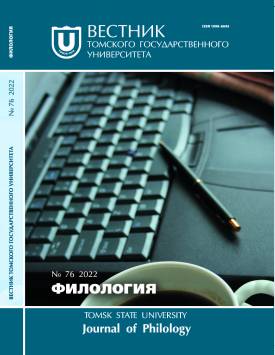Yegor Kovalevsky and Ivan Turgenev: From personal relationships to creative connections
The article deals with the social and literary relationships between Ivan Turgenev and Yegor Kovalevsky. The personal relationships between the writers are analyzed on the material of the Turgenev’s and his contemporaries’ epistolary, as well as their joint activities for the establishment and work of the Literary Fund. Turgenev’s correspondence is examined from the perspective of Kovalevsky’s mentions in it. The nature of the messages demonstrates mutual fondness, common aesthetic views. In addition, Turgenev was interested in Kovalevsky as an intermediary in solving literary and publishing issues, such as assisting Sovremennik in its relations with the censorship (the publication of the story “Mumu”, the release of the second edition of A Sportsman’s Sketches). The nature of the literary ties between Turgenev and Kovalevsky is studied on the example of the novel On the Eve and Travel Notes about the Slavic Lands. The similarity of views on the national liberation movement, the typological closeness of narrative details and entire episodes, and sometimes their almost literal coincidence allow us to consider the works of the two authors more objectively from the point of view of artistic and aesthetic parallels. The subject of Kovalevsky’s description in his essays on the Eastern question (“Llife and death of the last ruler of Montenegro”, “Three chapters from the political and military history of 1853, 1854 and 1855”) is the struggle of the Slavic peoples against the oppression of Turkish rule. Turgenev highlights the same problem through the image of Insarov in On the Eve. His interest in the national liberation movement of the Bulgarian people during the creation of the novel was caused by the Italian events of 1859 (the struggle of Garibaldi and the Italian people against Austrian rule) and the Eastern War between Russia and Turkey, which began in 1853. Turgenev could rely on some of Kovalevsky’s plot details, on the description of real events which he witnessed during the period of participation in the Danube Campaign and the Crimean War. Of particular interest is the development of the Italian theme in Kovalevsky’s works as a continuation of Turgenev’s idea of the woman’s role in the struggle for the homeland independence (“An episode from the war of the Montenegrins with the Austrians. From the memoirs of an eyewitness about Montenegro’s and Italy’s wars of independence”). A special point of the study is the comparison of landscape sketches and moments of perception by the characters (Turgenev) and the narrator (Kovalevsky) of painting art and theater art, which allows us to further substantiate the problem of artistic and aesthetic interaction or intersection between the two authors. The authors declare no conflicts of interests.
Keywords
Ivan Turgenev, Yegor Kovalevsky, On the Eve, Literary Fund, Eastern question, Travel Notes about the Slavic LandsAuthors
| Name | Organization | |
| Aleksandrova Elena V. | Tomsk State University | alexandrova.aulena@yandex.ru |
| Zhilyakova Emma M. | Tomsk State University | emmaluk@yandex.ru |
References

Yegor Kovalevsky and Ivan Turgenev: From personal relationships to creative connections | Vestnik Tomskogo gosudarstvennogo universiteta. Filologiya – Tomsk State University Journal of Philology. 2022. № 76. DOI: 10.17223/19986645/76/10
